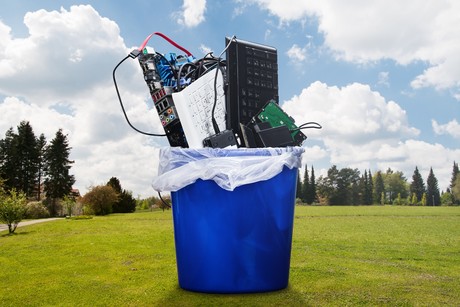Why are Australians holding onto their e-waste?

E-waste recycling service TechCollect is calling on Australians to consider the environmental impact of not recycling their electronic waste (e-waste), with a new survey commissioned by the company finding that one in five people (22%) consider themselves hoarders of old electronic devices.
When survey respondents were asked why they don’t recycle their e-waste, the main concerns surrounded the loss of personal data. 52% of respondents said they are worried they’ll lose personal data, while 64% are worried about the data in question getting into the wrong hands — the latter figure having increased by 25% since the survey was last held in 2015. 43% are meanwhile holding onto old devices in case they need them again one day.
Other reasons for not recycling e-waste include not knowing where to do so (83%), not wanting to pay for the service (58%) and not knowing it could be recycled in the first place (60%).
TechCollect CEO Carmel Dollisson said all Australians need to take an active role in being responsible for recycling the e-waste they are generating. Acknowledging that old devices can hold sentimental value, she stressed that their real value lies in the non-renewable resources they contain, which can be used in manufacturing when recycled correctly.
“Our new research tells us the average Australian household has approximately 17 electronic devices in the home and yet only 23% of us are always recycling them,” Dollisson said. “With the consumption of electronic devices getting higher all the time, it’s crucial consumers look at e-waste recycling as the natural next step in the product life cycle, especially when it no longer serves its purpose to them.”
As for those who do dispose of their e-waste, the results were not much better, with only 33% of respondents claiming to recycle their electronics at a designated drop-off site. Other responses included putting their e-waste on the nature strip for a scheduled council collection (28%) and throwing it in the garbage bin (25%), which means the product is almost certain to go straight to landfill.
“What is concerning in the research is 53% of respondents don’t know they can take their e-waste to an e-waste collection site to avoid it going to landfill, and 63% don’t know if their local council recycles,” said Dollisson.
“Taking e-waste to a designated drop-off site ensures materials that can be harmful to both people and the environment if put in landfill are correctly recovered or disposed of. Unfortunately, people who are putting the product on the kerbside or in the bin may feel they’re doing the right thing, but this doesn’t guarantee the product won’t still end up in landfill. It’s best to check with the local council about what happens to the e-waste.”
Finally, the survey explored respondents’ feelings of responsibility and guilt. For those who choose to recycle their e-waste, 74% do so because they feel responsible for the e-waste they produce. For those who don’t recycle, 18% said they feel very guilty and 46% say they know they could be doing more to help. 31% said they don’t really think about it.
“These findings … tell us most people feel responsible for the e-waste they produce and do feel an element of guilt when they choose not to recycle it,” said Dollisson. “But the sad reality is many people just don’t know what to do with their e-waste.
“It’s why TechCollect is keen to inform people about the importance of recovering the resources we already have in products that can be re-used, ensuring they understand the process of recycling their e-waste and where they can dispose of it.”
To find your nearest free TechCollect drop-off site, click here. For the full list of products that can be recycled by the service, click here.
New partnership to focus on textile recycling
Textile Recyclers Australia has joined forces with the ARC Research Hub for Microrecycling of...
TerraCycle marks a decade of recycling in ANZ
During its time in the region, the Australian and New Zealand TerraCycle network has grown from...
UNSW innovation extends the life of plastic waste
The new method, which also removes dyes from the original plastic waste, has attracted the...











